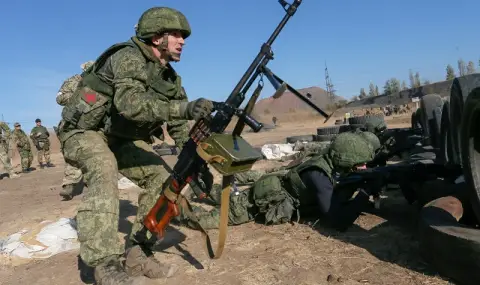The Russian Ministry of Defense (MOD) continues to inadequately supply Russian military personnel with basic equipment and ammunition, forcing soldiers to provide themselves with what they need.
On January 1, Russian military bloggers said that Russian forces are currently suffering from a widespread shortage of smoothbore small arms, which are usually used to defend against first-person shooter (FPV) drones on the front line.
This was summarized in its daily analysis of the situation in Ukraine by the Institute for the Study of War (ISW).
The military bloggers claim that Russian evacuation teams regularly have only with one or no smoothbore weapons when evacuating wounded personnel, and that Russian forces are being forced to purchase their own small arms and ammunition despite previous efforts by the Russian MoD to address the shortage of small arms on the front lines.
Another Russian military blogger, citing sources in the Rosgvardia, claimed that previous efforts to send hundreds of thousands of small arms confiscated from Russian civilians to Russian military units fighting in Ukraine had not solved the problem of the shortage of weapons.
The military blogger claimed that the Russian MoD and Rosgvardia did not cooperate or coordinate, so neither structure transferred weapons en masse to front-line units.
Another Russian military blogger disputed these claims, stating that Russian servicemen claimed to have received many confiscated smoothbore small arms.
On January 2, the Russian opposition media outlet Mobilization News published footage showing Russian servicemen complaining about the ongoing shortage of basic supplies and weapons.
Russian servicemen said that Russian personnel are regularly forced to buy their own food and military equipment to make up for the shortages.
In mid-January 2025, Russia and Iran are likely to sign a strategic partnership agreement that includes provisions in the fields of defense and military technology.
The Russian state-run news outlet "Izvestia" reported on December 26 that Iranian President Masoud Pezeshkian is expected to sign a Comprehensive Strategic Partnership Agreement with Russia on January 17 in Moscow, and the Iranian embassy in Moscow and Russian Foreign Minister Sergei Lavrov confirmed on January 2 that the visit would take place.
Israeli news outlet Ynet reported that the agreement likely includes provisions for Russia to supply Iran with Su-35 fighter jets, transfer of technology for the production of missiles and military satellites, and advanced defense systems such as the S-400.
Ynet reported that Iran likely plans to send Russia supplies of modernized models of Iranian strike drones in return. On January 2, a Russian military blogger suggested that Iran was preparing to transfer short-range ballistic missiles Fath-360 and Arman or Ababil anti-aircraft missile systems to Russia from the port of Bandar Anzali on the Caspian Sea.
One of the military bloggers claimed that Russia likely purchased the missiles and air defense systems from Iran, but another military blogger claimed that images of the alleged preparations for the transfer of these missiles did not fully resemble the Iranian Fath-360s and dismissed the suggestion.
Ukraine's decision not to renew its contract for the transit of Russian gas through Ukrainian territory is likely to have a significant impact on Russian gas revenues, despite the Kremlin's claims to the contrary.
"Gazprom" is likely trying to take advantage of the suspension of gas transit through Ukraine to create an artificial energy crisis and destabilize Moldova.
Ukrainian President Volodymyr Zelensky has signaled that Ukraine will increase drone and missile strikes against Russia in 2025 as part of efforts to get Russia to accept Ukraine's demands for a "just peace" in future negotiations.
Russia intends to issue Russian operating licenses for all six reactors at the Zaporizhzhia Nuclear Power Plant (ZAPP) by 2028. as part of Moscow's long-term efforts to legitimize its illegal occupation of the plant and exploit Ukraine's energy supplies.
Ukrainian forces launched a missile strike in the Kursk region, reportedly targeting a Russian military command post.
Ukraine's Main Directorate of Military Intelligence (GUR) has provided new details about the December 31 strike by a Ukrainian naval drone against Russian Mi-8 helicopters in the Black Sea.
Russian forces have recently advanced near Siversk, Toretsk, Pokrovsk, Kurakhovo and Ugledar, and in the western part of Zaporizhia Oblast.
